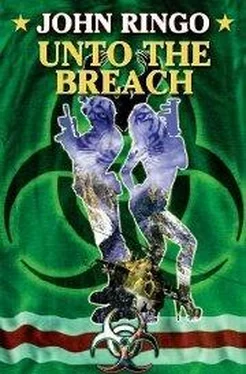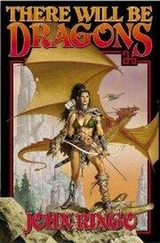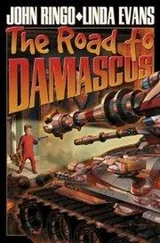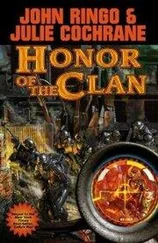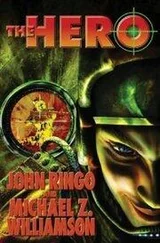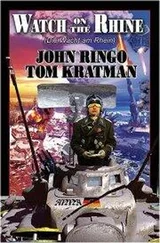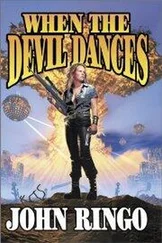Unto the Breach
by John Ringo
As always:
For Captain Tamara Long, USAF
Born: May 12, 1979
Died: 23 March 2003, Afghanistan
You fly with the angels now.
There were a bunch of people I had to get research help from on this one. As usual, Ryan Miller and Mike Massa contributed to technical operational help as well as HALO training details. I’d like to thank Christopher Austin, former member of the Army Hight Altitude Rescue squad for really professional input on the mountaineering portion. James Cochrane, husband of my coauthor Julie and Emil Prasowksi of the Army Marksmanship Training Unit supplied helpful advice on long-range shooting about which I previously knew virtually nothing. I’ll add that James, on the spur of the moment, took over a necessary four hour drive when I was so sleep deprived from writing I was babbling. The fact that I didn’t die in the midst of writing this novel is probably due to James and Julie. Thanks.
As usual, any mistakes are mine.
I’d also like to thank the girls at Hooters of Chattanooga for supplying gallons of sweet tea and keeping my ashtray emptied and my girlfriend for being just fine with me sitting in Hooters five hours a day.
“Working late, Doctor?” Boris asked, yawning and glancing at the scientist’s identity card.
Dr. Tolegen Arensky nodded, trying not to appear nervous. “One of my samples is done cooking; I have to test it when it’s fresh.”
“Better you than me,” Boris replied, handing the ID back and making a note on his log-sheet. “If I ever have to pass the doors of even level one, it will be too soon, yes?”
“The day we have to call security into the quarantine zones is the day I quit,” Dr. Arensky said with a weak smile. “I barely trust our research assistants in there, no offense.”
“None taken,” Boris replied with a shudder, pressing the solenoid under his desk. At the sound of the all-clear buzzer the over-watch, observing the entry room from a remote security station, opened the sliding steel entry door and Dr. Victor Arensky started the last hour of his tenure in Russian biological research.
He passed through another metal door, nodded at the sleepy guard on the far side and turned right towards his office. If he had turned left he would have quickly confronted a third steel door and the various processes required to enter Quarantine Level One. Since he generally worked in Level Four or even Five getting to his primary labs was a daily chore.
Staying in the outer “non-quarantine” zone of the hexagonal building he passed seven office doors, all on his right and representing by their names and title plates descending levels of power in the institute, passing his own at the seventh. Any sample, of course, would be cooking away in Level Four — nobody did any more research in Five since the “incident” nearly ten years ago — but he hoped that the guards would be their usual efficient self and ignore that.
He went past his room, however, and stopped at the very end of the corridor. There was one more door there, a janitor’s closet. He entered the janitor’s closet and removed some bottles of ancient and dust covered bleach from the third shelf on the left. From under his bulky winter coat he removed a vaguely pyramidal object and stripped a coating from the flat underside revealing a sticky tape. He pressed the object against the wall then very gently unscrewed the tip of the object which was cylindrical. On the base of the screw device was a plastic plug with a round plastic tab jutting from it. He grasped the tab and pulled, removing the plug with a vaguely “pock” sound. As he did a blue LED on the other end of the cylindrical device began to blink. He carefully screwed the cylinder back into the device and then placed the plastic plug in his jacket pocket.
That done he proceeded back to his office.
As he entered the room he removed his heavy outer coat and fur hat, hanging them on the coat-rack by the door then followed them with his suit coat and donnned his lab coat. After a moment’s thought, after actually turning to his desk, he paused, removed the lab coat and redonned his suit coat. After another moment’s thought he removed the heavy jacket and fur hat and placed them on his desk.
The office was small, barely adequate to fit his desk, a safe in one corner and a filing cabinet. It was also spartan. On the desk was a lined pad, a pencil and a framed photograph. On the back wall was a picture of the current Russian president. A slight discoloration around the frame indicated that there had once been a larger picture in the same spot. It also indicated how long it had been since the office was painted.
Picking up the briefcase that was already in the room he set it on the desk and opened it. Turning to the safe, the combination for which the facility administrator did not have even if the idiot thought he did, he dialed in the combination from memory and opened it. Inside were four steel containers. Smuggling them to his office had taken the better part of two nerve-wracking months but getting them out of the building was impossible; everything leaving was searched with otherwise abnormal efficiency.
Which was why he was here at three o’clock in the morning.
He opened the briefcase and slitted the containers into the pre-cut slots in the foam rubber inside. He then removed ten CDs from the safe and carefully arranged them on the face of the foam rubber. He started to close the safe then paused and picked up the framed picture on the desk. He looked at it for a moment and then carefully removed the picture itself, sliding it into the briefcase before closing and locking it.
His preparations complete he centered the briefcase on the desk, sat down on his hard wooden chair and steepled his fingers in front of him. After a moment he looked at his watch. He would continue to do so every nine seconds, unthinkingly and really unseeing, for the next three minutes and forty seven seconds.
* * *
At the same moment as Boris was questioning the doctor on why he was arriving to work at three in the morning, on a narrow road nearby a delivery truck was stopping at a police checkpoint.
Police checkpoints were so ubiquitous, and greedy, in the Confederation of Independent States, the former Soviet Union, the only surprise on the part of the driver was to find one at this time of the morning at such an out-of-the-way spot. However, based upon their standard police car and there being only two of them it was probably a roving patrol that had chosen a side-road to “raise some revenue.” If they were on the main road it would be obvious and they’d have to cut their watch supervisor in on their take. Out here nobody was going to notice.
The driver braked to a stop and pulled out his license and registration, slipping a ten ruble note between them. He’d put it in an expense report and probably be paid back, eventually. Karenska Pharmaceuticals could afford the bribes; they were after all a part of doing business in Russia. They were so common, they weren’t even considered bribes. Given the way that all public servants were paid these days it was almost reasonable for the cops to increase their salaries in this way. But they could be God-damned greedy about it.
“License and registration,” the officer said as the driver rolled down the window. There was another officer on the passenger’s side, waiting patiently. Not common but not unknown. Generally they were both on the driver’s side so that the partner could be sure of the take. The strangest thing about the policeman, the driver noticed in the last moments of his life, was that he was unusually fit and professional looking.
Читать дальше
